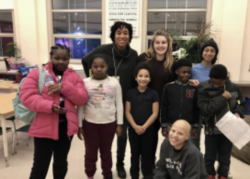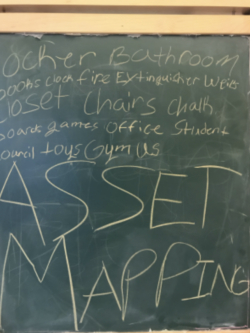This blog is part of a series that highlights the strong SEL practices educators are implementing in their classrooms and schools, thanks to support from the NoVo SEL in Action grants.
A young boy stands in front of a school auditorium, waiting for the students to quiet down. He’s slightly out of breath, having run to school because he was perfecting his speech at home all morning. As the room quiets, he introduces himself and begins:
“My name is Jalen and I’m running for the Secretary of Education in the Scholar Council. You should vote for me because I will find a way for your wishes to come true, but it has to be realistic.”
The crowd erupts in laughter and the teachers cheer. This is the first speech given during the day’s morning meeting. Fifteen additional speeches follow over the next three days. Student’s speeches are based on campaigns of their design to convince peers to vote for them in a school-wide election for Scholar Council.
The Scholar Council—a NoVo funded grant project led by the University of Pittsburgh’s Heinz Fellows Program*—is a dedicated space for student self-advocacy and civic education. The council is made up of five positions, filled by 3rd–5th graders that have been elected by their peers. The council is allocated a $1,000 yearly budget they can apply to a project of their choosing. Council members and staff receive student development or professional development (PD) related to the project.

Scholar Council students work together to increase opportunities for student voice in the school building.
The goals of the Scholar Council are numerous, including:
Throughout the academic school year, students and teachers work to achieve the goals of Scholar Council by engaging in the following activities:

Scholar Council students are given a small budget to address problems in their school buildings with a collaborative approach.
Out of the fifteen students that ran for Scholar Council, five of them worked together from October-April to increase opportunities for student voice in the school building. The elected council members engaged in two (out of a scheduled four) student development sessions before schools closed in March. These sessions focused on leadership development, community organizing, and community asset mapping. We used all of these techniques in the planning for the Council project. We were also able to host one (out of a scheduled three) planned teacher professional development sessions before the COVID-19 closures. This session focused on breaking down classroom power dynamics, truly listening to students’ needs and behavior, co-creating a space that allowed for mutual vulnerability and conversation, and teacher self-care and reflection.
Together, our council members and teachers were engaged in an intentional collaboration that increased student joy, safety, and ownership within the school space. Our goal, as Heinz Fellows, is to liberate educational spaces; centering the SEL of both students and teachers and centering students’ identities and humanity above all else. Our work is rooted in the brilliance of Rich Milner, Bettina Love, Gloria Ladson-Billings, Torie Weiston-Serdan, and Paulo Freire and is impossible without the brilliance of the students, teachers, and communities that we work with.
*The Heinz Fellows Program offers an extraordinary, year-long opportunity for forward-thinking, social justice-oriented individuals who are interested in advancing equity in education. Fellows work in urban schools in collaboration with teachers, staff and school leaders to support students in academic, social, and emotional growth while building knowledge and skills necessary to work in urban contexts.
As part of our work in urban school systems, we design YPAR (Youth Participatory Action Research) projects that address issues that we are seeing in schools. These projects are based on the research and writings of Rich Milner, Bettina Love, Gloria Ladson-Billings, and Paulo Freire and are co-created with the students that we are working with, and aim to create sustainable change that enhances the students’ experiences. One such project was the Scholar Council, identified through conversations with students about what they wanted to see happen in their school space and their frustration with their limited power in educational spaces at large.

